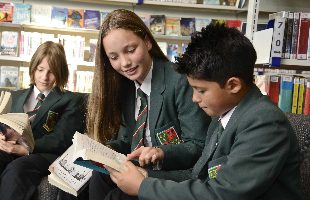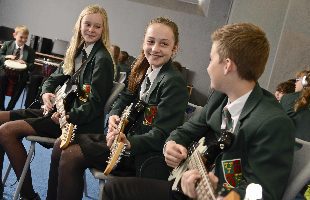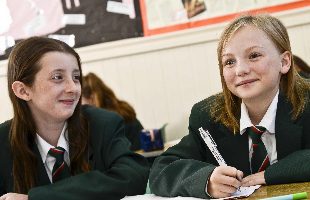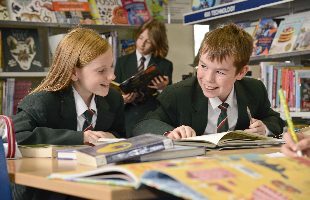History
A people without the knowledge of their past history, origin and culture is like a tree without roots’
Marcus Garvey
Year 7
The Rationale:
History starts in Year 7 with a skills unit to establish understandings of historical eras, chronology and the use of sources and inference skills as a base from which to study the subject. The rest of Year seven moves in chronological order through the Medieval Period in Europe, from the Anglo-Saxons through to the end of the Medieval period. There is a mix of social and political history, focusing not only on the lives of the leaders but also those of the everyday people. Year 7 ends with the dawn of the Early Modern period with the upheavals of the Renaissance and the Protestant Reformation under the Tudors. Through each historical enquiry, students are focusing on developing the skills of critical reasoning, forming substantiated judgements and communicating these in organised, nuanced extended writing.
| Autumn Term 1 | Autumn Term 2 | Spring Half Term 3 | Spring Half Term 4 | Summer Term 5 | Summer Term 6 | |
|---|---|---|---|---|---|---|
| Curriculum Knowledge | Topic 7.1 What is History? Skills Topic 7.2 Were the ‘Dark Ages’ really dark? | Topic 7.3 Why did William win at Hastings? Topic 7.4 Is Marc Morris right about the significance of the Norman Conquest? | Topic 7.5 Why was the Church so important to Medieval people? Topic 7.6 What makes good historical fiction about life in the Medieval village? | Topic 7.7 Church, Courtiers or Crown? Who was really in control in medieval England? a) What does Becket’s death tell us about the power of the Church? b) What did Magna Carta mean for the power of the King? | Topic 7.8 Rats and Rebels: Was the Black Death or the Peasant’s Revolt more historically significant? | Topic 7.9 Renaissance and Reformation a) What was Martin Luther trying to achieve in 1517? b) Why did Henry VIII break with Rome? c) How much did the Reformation change peoples’ lives? |
| Subject Skills | Chronology Source Analysis Deduction and Inference Comprehension of historical texts Evaluation of arguments | Historical causation Using sources to make inferences about the past Debating historical significance Grappling with historical texts | Source Analysis Empathy of other cultures and traditions Creative writing Historical research | Using interpretations of historical periods Research skills Evaluation and analysi Extended writing Government and power | Historical significance Comparison and analysis Change and continuity | Causation and the role of individuals Evaluation Extended writing Creating argument Change through time |
| How can you help your child engage with the content? | Talk about using evidence when making claims and argumentsDiscuss what different historical artefacts tell us about the people who made them when visiting museums and historical sites | Visit Norman castles such as Lancaster, Carlisle, Skipton and many others.Even discuss the remains of Kendal castle on a walk. Watch Dan Snow’s Battlefield Britain documentary on the Battle of Hastings | Discuss church architecture from an historical point of view when you pass or visit. Visit some old monasteries and abbeys | Discuss the time periods of historical films and what time period they were set in. | Use Seneca to do some quizzes on the medieval period | Discuss the impact the protestant reformation had on the appearance of churches in your local area |
| Curriculum Opportunities | History Society | History Society | Motte and Bailey Castle Building Competition Visit to a Medieval Castle Trip | History Society | History Society | History Society |
Year 8
The Rationale:
History in Year 8 is focused on the birth of the modern world, looking at the tumultuous sixteenth and seventeenth centuries of civil war and religious persecution and then considering how trade and exploration gave rise to the British Empire. This allows us to study difficult subjects such as the impact of empire on cultures around the world and the connections between racial ideas and slavery. We also consider the rise of industry and the impacts this had on the landscape of Britain, using local studies to understand the role of Cumbria and Lancashire in the development of modern, urban Britain. This year ends with what is often considered to be the devastating culmination of empire and industrial revolution: the First World War.
| Autumn Term 1 | Autumn Term 2 | Spring Half Term 3 | Spring Half Term 4 | Summer Term 5 | Summer Term 6 | |
|---|---|---|---|---|---|---|
| Curriculum content | Topic 8.1 Is a picture worth a thousand words? How did Elizabeth I use propaganda? Topic 8.2 Why did England go to war with itself in 1642? | Topic 8.3Does Oliver Cromwell Deserve his statue in Parliament Square? Topic 8.4 What did the Restoration restore? | Topic 8.5: What does the witch craze tell us about society in the seventeenth century? Topic 8.6: How did experiences of the British Empire vary across the globe? | Topic 8.7: How has the Transatlantic Slave Trade impacted on race relations today? Topic 8.8: How did factories create cities? | Topic 8.9: How far did the Industrial Revolution change Lancaster? | Topic 8.10 How did two bullets lead to 20 million deaths? Topic 8.11 What dot he forgotten armies of WWI tell us about the western front? |
| Key Skills | Source analysis Symbolism in art Critical analysis of media Understanding of motivations behind media | Debate Creating substantiated judgement Understanding of evolution of democracy Civil Rights and Freedoms | Understanding of experience of women in History Understanding cultural ideas Forming substantiated judgements Understanding difference and diversity around the globe | Understanding origins of ideas of race Reinforcing values of empathy, equality Understanding the modern landscape | Identifying change using maps Source analysis Creating substantiated judgement Understanding of local past | Awareness of global diversity of the war effort Causation and identifying causal factors Prioritising and forging links between factors to create argument Extended writing |
| How can you engage with your child? | Watch documentaries on Elizabeth I, such as David Starkey’s Elizabeth, on YouTube. Discuss what propaganda is and how it is used today – encourage critical thinking about how messages and information are used in the media, politics and advertising. | Visit some of the Civil War battle field sites if you are in their areas. Discuss the role of monarchy in the country both today and in the past. | Visit Pendle in Lancashire for an insight into the infamous witch trials case study there. Visit Lancaster castle to find out about the experience of imprisoned ‘witches’ there. | Visit the Slavery museum in Liverpool if you get the chanceInvestigate Lancaster’s Slave Trade History – look out for names of streets based on its slaving history.Discuss current affairs in race relations e.g. the pulling down of the Colston State in Bristol and how Black Lives Matter have used history in their campaigns | Explore the mill towns of our area from a historical point of view to understand our architecture and role in the development of Britain’s industry. | Watch WWI documentaries and visit the Imperial War Museum if you get the chance. |
| Curriculum Opportunities | History Society | History Society | History Society | History Society | History SocietyVisit to Styal Mill in Cheshire | History Society |
Year 9
The Rationale:
Year 9 focuses on studying the twentieth century from a very international perspective and gives us a window into understanding government, politics, international relations and ideology that informs our culture today. We look at the gender inequalities of the early part of the century and the political revolution for women and then look to study political ideologies in the context of the inter-war period, the rise of the dictators and the reasons for the descent into WWII. We then seek to understand how the atrocities of different genocides in this era have come about in order to recognise and end persecution and finish our KS3 History with a study of the Arab Israeli Conflict as a case study of how history has become politically charged and how competing narratives can run alongside each other, challenging students to understand that history is constructed, rather than merely events that ‘happened in the past’.
| Autumn Term 1 | Autumn Term 2 | Spring Half Term 3 | Spring Half Term 4 | Summer Term 5 | Summer Term 6 | |
|---|---|---|---|---|---|---|
| Curriculum content | Topic 9.1: Who achieved the most in the fight for women’s suffrage? | Topic 9.2: How far did he Treaty of Versailles pave the way for peace? Topic 9.3: Why did people look to the political extremes for solution in the 1930s? | Topic 9.4 Was Hitler always intent on war? Topic 9.5: Can genocide be prevented: Learning from the atrocities of the twentieth century | 9.6. How can we reconcile conflicting narratives of the Arab Israeli Conflict? | GCSE History: Crime and Punishment in the Medieval Period | GCSE History: Crime and Punishment in the Medieval Period |
| Key Skills | Understanding of parliamentary democracy Awareness of past gender inequalities Awareness of challenging injustice Understanding the purpose of remembering historical events and persons | Coming to substantiated judgements Evaluating consequences of events Understanding of international relations and politics Understanding political and economic ideologies and evaluating them. | Generating awareness of how international relations operates Narrative technique in History Coming to substantiated judgements Awareness of the origins of global injustice forming from prejudice and othering of groups Challenging injustice | Awareness that History is an interpretation Awareness that History is always a political and ethical construct which can be used to support present narratives. Generation of empathy and understanding for cultural traditions and perspectives of others. Understanding of context of troubles of the Middle East | Identifying and explaining change through time Awareness that justice system reflects current values Debate Consideration of the reasons for current institutions and ideas in law and justice systems | Identifying and explaining change through time Awareness that justice system reflects current values Debate Consideration of the reasons for current institutions and ideas in law and justice systems |
| How can you engage with your child? | Discuss students’ learning in class and ask questions.Visit and discuss historical memorialsDocumentaries: Lucy Worsley’s ‘Suffragette’ | Discuss political ideas such as communism, socialism and capitalism. Talk about current affairs and ways of governing the country.Visit the Imperial War Museum | Discuss political ideas such as communism, socialism and capitalism. Talk about current affairs and ways of governing the country.Visit the Imperial War Museum | Watch the global news regarding the Middle East and discuss the origins of this conflict. | Visit Lancaster castle for the tour of methods of punishment and law enforcement through time – this is an excellent and very relevant tour. | Discuss current ethical debates on the death penalty and imprisonment. |
| Curriculum Opportunities | History Society | History Society | History SocietyHolocaust Memorial Day Webinar with a Holocaust Survivor | History Society | History Society | History Society |






